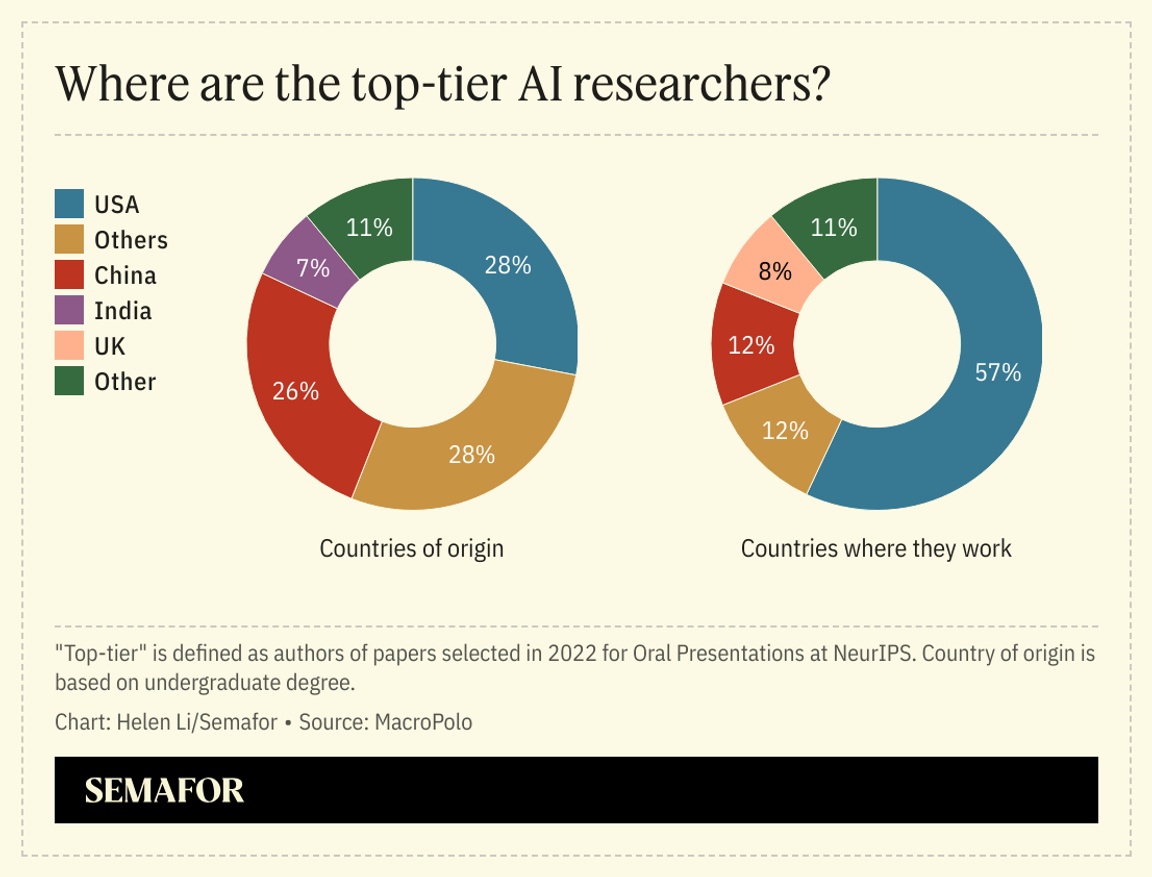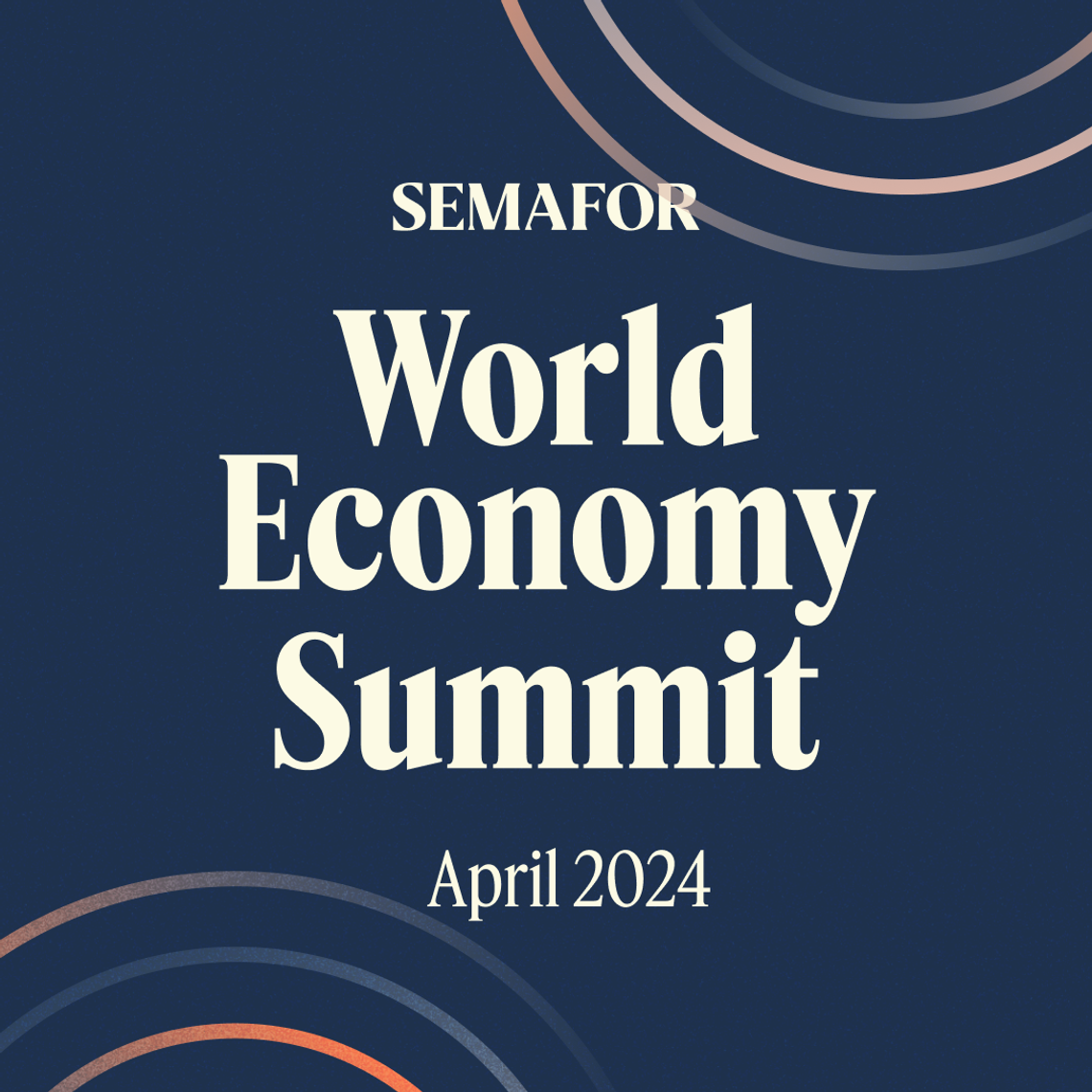| | A Trump-Biden rematch kicks into high gear, EV companies want a slice of the Indian market, and Osca͏ ͏ ͏ ͏ ͏ ͏ |
The World Today |  - Bibi-Biden tensions grow
- US rematch heats up
- AI talent dominated by US
- China plots huge chip fund
- India’s accelerating EV race
- Solar’s US dominance
- Kyiv slams Pope’s remarks
- Strikes threaten Paris games
- A plant-based meat giant
- A beer revival, 20 years on
 How much you can make off an Oppenheimer Oscar win, and Shanghai’s new nightlife trend for people who hate bars. |
|
Bibi vows to cross US ‘red line’ |
 JACQUELYN MARTIN/POOL/AFP via Getty Images JACQUELYN MARTIN/POOL/AFP via Getty ImagesIsraeli Prime Minister Benjamin Netanyahu vowed to defy U.S. objections and invade the Gazan town of Rafah after ceasefire talks fell apart. His remarks came after U.S. President Joe Biden told MSNBC that Netanyahu was “hurting Israel more than helping,” and said he was open to addressing Israel’s parliament to convince lawmakers of his stance. Though Biden described a potential Rafah operation as a “red line,” he insisted he would not cut off weapons support for Israel. As Biden grows more publicly frustrated with Netanyahu, he is pursuing a “tricky maneuver” of breaking with the prime minister but sticking with the country he leads, Axios’ Barak Ravid wrote. |
|
Trump-Biden rematch heats up |
 A Trump rally in Georgia. REUTERS/Alyssa Pointer A Trump rally in Georgia. REUTERS/Alyssa PointerThe U.S. presidential election rematch roared into high gear over the weekend, as incumbent Joe Biden began a $30 million ad blitz in swing states and predecessor-turned-challenger Donald Trump ratcheted up his attacks over immigration. Both campaigned in the state of Georgia on Saturday and could officially clinch their parties’ nominations during primary elections Tuesday. Another Trump-Biden showdown has been long-expected but highly dreaded among an American electorate that broadly disapproves of both candidates and would prefer fresher — and younger — options. Biden and Trump on the ballot is “like choosing between a hedgehog and a porcupine,” a South Carolina voter told The Guardian. |
|
US reigns supreme for AI talent |
 China and India are doing a better job at retaining homegrown artificial intelligence talent, but the U.S. remains the top destination for researchers in the field, according to a new report. More than half of the world’s high-end AI researchers — only a quarter of whom are American — worked at U.S. institutions in 2022, the think tank MacroPolo said. But that could change as India and China ramp up domestic AI development efforts, leading to a shift in recent years in which “more top-tier talent are staying put in their home countries,” the report stated. About 55% of top researchers worked in a country other than their homeland in 2019, but that figure dropped to 42% by 2022. |
|
China raises huge chip fund |
 Semiconductor production workshop in Gao'an, Jiangxi Province, China. Costfoto/NurPhoto via Getty Images Semiconductor production workshop in Gao'an, Jiangxi Province, China. Costfoto/NurPhoto via Getty ImagesChina is reportedly readying a $27 billion fund to accelerate its push into cutting-edge chips. The “Big Fund” aims to pool capital from all levels of government with the aim of carrying out bigger projects than would be possible at provincial or local levels, Bloomberg reported. The move is the latest in a series of efforts by Beijing to undermine a U.S. push to curb China’s access to cutting-edge semiconductor technology, one in which Washington has enlisted key allies whose companies supply advanced chip making equipment. Chinese officials are increasingly developing new public-private partnerships to develop key chip-related technologies, and are “worried about future controls,” a new paper by a China chip expert noted in American Affairs Journal. |
|
The race for India’s EV market |
 India spurned Tesla’s demands for tariff concessions as the country’s electric-vehicle market shifted into high gear. Foreign and domestic carmakers are aggressively competing for a slice of India’s fast-growing EV market: Indian industrial conglomerate JSW Group recently announced plans for a factory that could produce 400,000 EVs annually, while China’s BYD has made inroads thanks to imports, but both are minnows compared to local giant Tata Motors. Tesla, meanwhile, is negotiating over tariff restrictions before opening a factory, so far unsuccessfully. The government is aiming for 30% of all passenger cars to be EVs by 2030 — from just 1% now. |
|
Solar dominates new US power |
 More than 50% of new electricity generation capacity added to the U.S. grid in 2023 was solar. It’s the first time since World War II — when a huge amount of hydropower was built — that a renewable power source has represented most of the country’s energy additions. Ostensibly conservative Texas and progressive California accounted for the bulk of the 32.4-gigawatt increase, indicating the surge is not down to politics. Supply chain constraints slowed solar panel deliveries, but those issues have eased and companies have found workarounds. An official at a major U.S. solar-power trade group told the climate-focused outlet Grist that the 2023 numbers were “monumental.” |
|
Pope slammed over ‘white flag’ remarks |
 Vatican Media/Handout via REUTERS Vatican Media/Handout via REUTERSUkraine rejected Pope Francis’ call for Kyiv to have “the courage of the white flag” and negotiate with Russia to end the war. Ukraine’s foreign minister said in response: “Our flag is a yellow and blue one.” Francis has sympathized with Ukrainians and criticized Russian brutality, but he’s also accused NATO of causing the invasion. His position “puts him more in line with Beijing, New Delhi, and Brasília than Washington, London, or Brussels,” the editor of Catholic news website Crux wrote last year. The U.S. establishment also appears to be shifting, however: The former head of the Council on Foreign Relations noted in a recent interview that the White House’s staunch rhetorical support for Ukraine’s ambitions “was and is untenable.” |
|
 Lael Brainard, Director of the White House National Economic Council; Julie Sweet, CEO Accenture; and David Zapolsky, SVP, Global Public Policy & General Counsel, Amazon have joined the world-class lineup of global economic leaders for the 2024 World Economy Summit, taking place in Washington, D.C. on April 17-18. See all speakers and sessions, and RSVP here. |
|
Strikes loom over Olympics |
 REUTERS/Gonzalo Fuentes REUTERS/Gonzalo FuentesA major French union threatened strikes, including at hospitals, during the Paris Olympics. The French capital expects almost 16 million visitors this summer, but discontent is simmering: Huge protests followed President Emmanuel Macron’s decision last year to raise the retirement age to a level that is still below the European average. Union leader Sophie Binet said the games would affect thousands of workers’ hours and holidays, and that the government should “take immediate action to ensure [the Olympics’] success.” France is hoping for 20 gold medals at the 2024 games, although its ambitions would no doubt be set higher if going on strike was an Olympic sport. |
|
Meat giant’s plant-based shift |
 Oscar Mayer Oscar MayerThe meat giant Oscar Mayer is launching a range of plant-based hot dogs and sausages. The plant-based meat industry has suffered a retrenchment in the last year: Pioneering firms Beyond Meat and Impossible Foods have seen falling demand and are reducing overheads. But Kraft Heinz, Oscar Meyer’s parent company, eyes an opportunity: It signed a deal with the plant-based food company NotCo in 2022. A spokesperson said the stumbling block is “disappointment in existing offerings’ taste and texture,” but that the reasons why people want meat alternatives — health, animal welfare, and the environment — are not going anywhere. Analysts forecast that the plant-based meat market will double to more than $19 billion by 2030. |
|
Chilean beer goes viral, 20 years later |
 OMD Chile / Efex via Wikimedia OMD Chile / Efex via WikimediaA Chilean beer brand is having a renaissance after its award-winning — but legally dubious — ad campaign from the early 2000s resurfaced online. In 2003, Cerveza Cristal edited advertisements into Chilean television broadcasts of the original Star Wars trilogy, resulting in clips that purported to show Obi-Wan Kenobi reaching for a cold one instead of a lightsaber, followed by the brand’s jingle. George Lucas’ production company successfully sued on intellectual property grounds at the time, but the clips’ recent virality on social media has become “a source of pride for any Chilean,” the company’s former marketing head told a Chilean newspaper. The brand could use a boost: Its parent company’s net income dropped 10% last year. |
|
 March 11 - Spain commemorates the 20th anniversary of the 2004 Madrid train bombings, which killed nearly 200 people.
- Malaysian Prime Minister Anwar Ibrahim makes his first official visit to Germany, meeting with Chancellor Olaf Scholz and hosting Ramadan-related events.
- U.S. intelligence officials testify before the Senate Intelligence Committee on worldwide threats to American security.
|
|
 The betting odds for Oppenheimer winning Best Picture heading into the Oscars on Sunday, according to FanDuel. It’s such a frontrunner that you’d have to pony up $5,000 in order to win just $100 were the film to take the top prize. The Oscars caps off a memorable year for Hollywood that included the “Barbenheimer” phenomenon, when Oppenheimer and Barbie were released on the same day. Their dual — and dueling — commercial success was an “obvious sign of the vigor of the cinemascape,” The New Yorker’s Richard Brody wrote. |
|
 CFOTO/Future Publishing via Getty Images CFOTO/Future Publishing via Getty ImagesMore people in Shanghai are choosing to forego traditional nightlife spots and instead pay to drink and socialize at strangers’ homes. The trend involves converting a personal residence into a bar and charging customers an entrance fee for unlimited drinks, the Chinese outlet Sixth Tone reported. “Home bars” have become popular among office workers who “feel out of place in the city’s typical bars and clubs” and prefer a laid-back, house party-like environment. Owners and hosts, though, face challenges, including licensing requirements and heightened competition as the trend takes off. Some are adding extra entertainment to attract customers; one host said he transformed a bedroom into a mahjong room and sometimes invites astrologers and tarot readers. |
|
| |